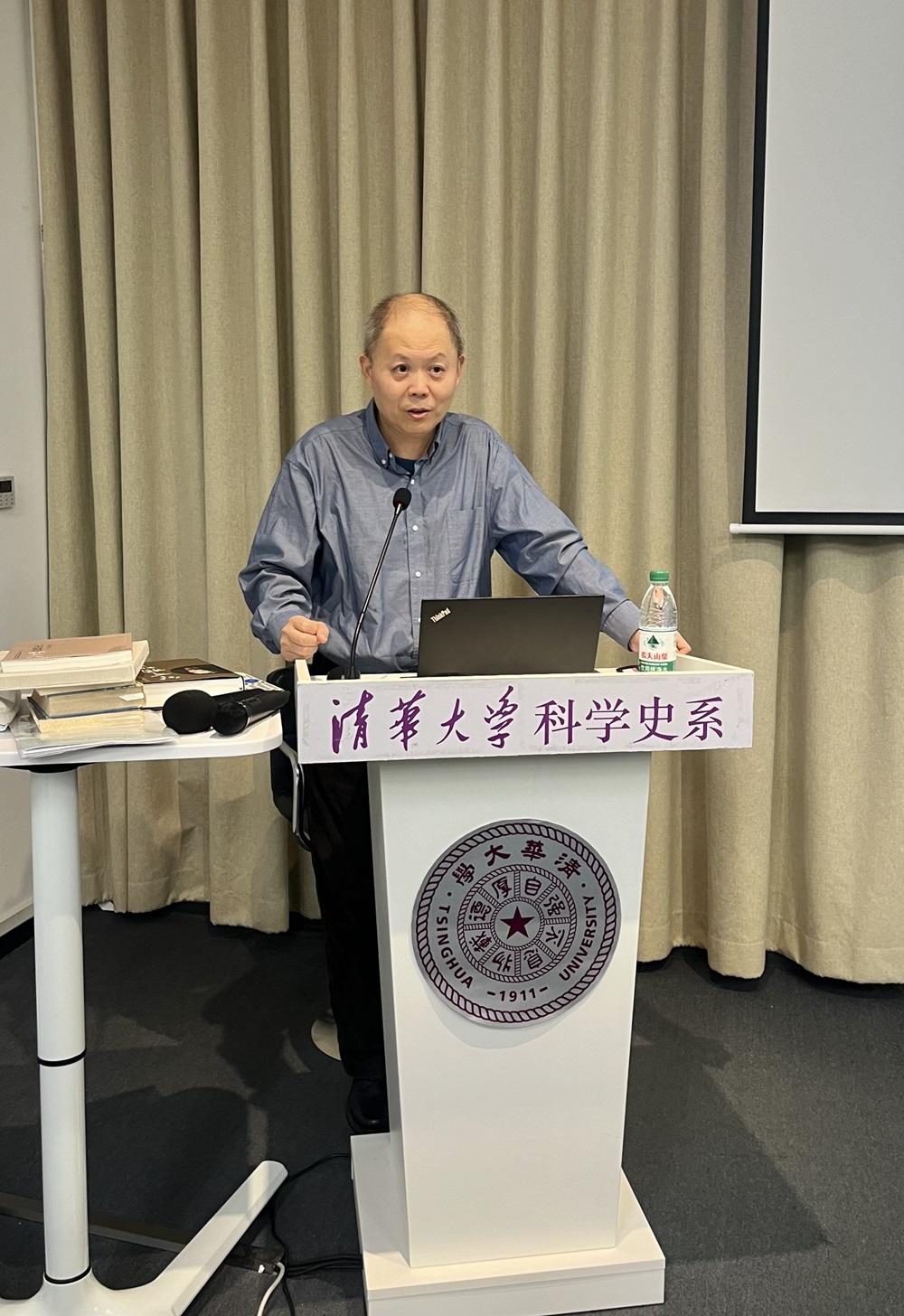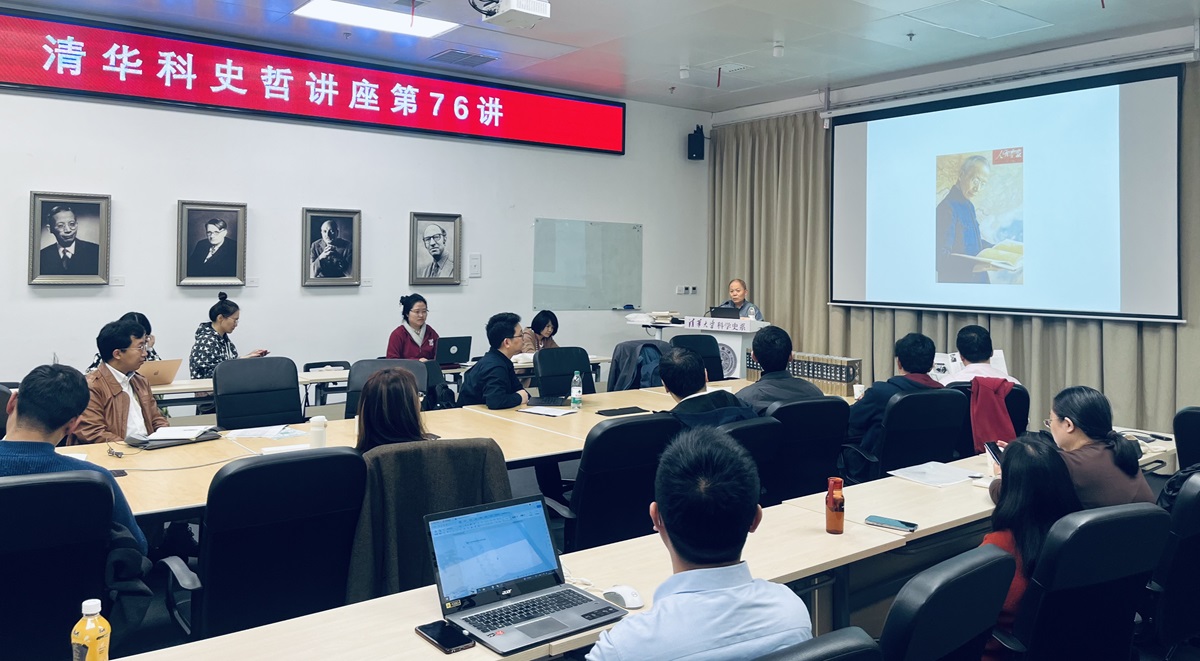On October 18, 2024, Tsinghua University’s Department of the History of Science hosted the 76th session of the THU History and Philosophy of Science Lecture Series in Room B206 of the Humanities Building. Chaired by Associate Professor Shen Yubin, the lecture featured renowned science culture publisher Pan Tao, who spoke on "Zhu Kezhen and Tsinghua University."
First, Professor Shen introduced Pan Tao. Dr. Pan earned his Ph.D. in Philosophy in 1998 from Peking University’s Center for Science and Society, with extensive academic and publishing experience. Over 26 years in editorial publishing, he served as Deputy Editor-in-Chief of Shanghai Science and Technology Education Press, Editor-in-Chief of Shanghai Lexicographical Publishing House, and Editor-in-Chief of Gold Wall Press. He was repeatedly honored as "Shanghai Leading Talent" and "National Leading Talent in News and Publishing." Dr. Pan curated science culture series such as Philosopher’s Stone Series (Zherenshi Congshu), Princeton Science Library (Pulinsidun Kexue Wenku), Eight Winds Collection (Bamianfeng Wencong), and Cihai Translation Series (Cihai Yicong). He also led major publishing projects including Collected Works of Zhu Kezhen (Zhu Kezhen Quanji), History of Technology (Jishu Shi), Cambridge World History of Human Disease (Jianqiao Shijie Renlei Jibingshi), and History of Chinese Medicine (Zhongguo Yishi), winning the inaugural "Science Culture Publisher Award" in 2013. He translated classics such as Phase Transitions (Xiangyue), From Pendulum to Chaos (Cong Bai Zhong dao Hundun), and Does God Play Dice? (Shangdi Zhi Touzi Ma?), and authored the essay collection Magic Servants and Clay Men: What Is Not Science (Mo Pu yu Niren: Shenme Bushi Kexue). Dr. Pan has made significant contributions to the history of science, translation, and publishing in China.

Dr. Pan opened by displaying rare photographs of Zhu Kezhen, sharing historical anecdotes behind each image. He then recounted Tsinghua’s early history: from the signing of the Boxer Protocol (Xinchou Tiaoyue), the establishment of the Preparatory School for Studying in America (Youmei Yiguan), the evolution from Tsinghua College (Qinghua Xuetang) to Tsinghua School (Qinghua Xuexiao), and finally the founding of National Tsinghua University (Guoli Qinghua Daxue) in 1928. In July 1910, Zhu Kezhen ranked 28th among 70 students admitted in the second U.S.-bound examination. Dr. Pan analyzed historical records from Tsinghua’s alumni directories, reconstructing Zhu’s trajectory to demonstrate his status as a Tsinghua alumnus.
In the second section, Dr. Pan examined interactions between Mei Yiqi and Zhu Kezhen, focusing on the 1944 recruitment of Southwest Associated University students for an interpreter training class (yiyuan xunlianban) during World War II. As U.S. troops poured into China’s interior, interpreters were urgently recruited from elite universities. Dr. Pan further detailed Zhu’s meetings, reports, and social engagements, highlighting his network—including Chen Yinke, Zhao Yuanren, Mei Yiqi, Ye Qisun, Zhao Jiuzhang, and Qian Xuesen—to underscore Zhu’s deep ties to Tsinghua.

In the latter part, Dr. Pan outlined future directions for Zhu Kezhen research. Supplements to the 24-volume Collected Works of Zhu Kezhen (Zhu Kezhen Quanji) are underway; the research anthology Zhu Kezhen and His Era (Zhu Kezhen he Tade Shidai) is forthcoming; and The Extended Chronicle of Zhu Kezhen (Zhu Kezhen Nianpu Changbian) Volume 1 (1890–1927) will soon publish. Dr. Pan also showcased rare archives, letters, and diaries revealing previously unknown details: Lu Hongtu’s letters, Mei Yiqi’s telegrams, Feng Jinglan’s correspondence, student assistance cases, academic reviews, exchanges with Joseph Needham, meetings with Liang Sicheng, and work on the Committee on the History of Natural Sciences. He additionally noted common errors in media and academic descriptions of Zhu and revisions to Zhu’s entries across editions of Cihai (The Sea of Words).
After the lecture, faculty and students—including Wu Guosheng (Tsinghua), Liu Xiao (Tsinghua), Shen Yubin (Tsinghua), Wang Jun (Peking University), and Hu Xiaojiang (Beijing Normal University)—posed questions:
- As a meteorologist, why was Zhu Kezhen particularly concerned with educational philosophy?
- How did Zhu deploy meteorological observers (cehouyuan) nationwide?
- What was the organizational structure of meteorological surveys then?
- What were Zhu’s intersections with George Sarton?
- What unexplored topics exist in Zhu’s diaries?
- How did Zhu receive updates while in remote Guizhou?
Dr. Pan addressed each query and engaged in lively discussion.
Documented by: Sun Yifan
Reviewed by: Shen Yubin

